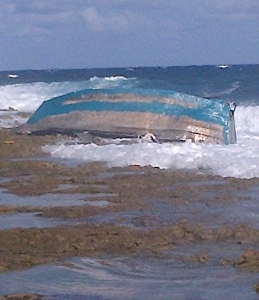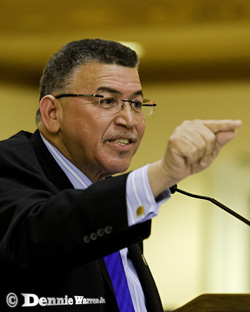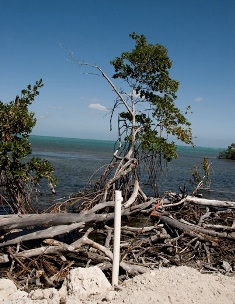Archive for November 25th, 2013
Premier promotes Cayman in special video for JMC
(CNS): The Cayman Islands premier has recorded a video to promote the Cayman Islands for this week’s overseas territory meeting in London. During the course of this week Alden McLaughlin and his ministerial colleague Wayne Panton will be flying the flag for Cayman at the table with FCO officials as the mother country engages in talks with all of its territories' leaders and discusses the continued relationship. With public finances at the fore, as well as issues such as conservation and the financial services sector, this year’s meeting will also see the OT leaders mingle with UK investors. The short video describes Cayman’s natural beauty as well as the economy and invites people to come see the islands for themselves. Go to video

Law won’t hit property rights
 (CNS): The proposed National Conservation Law will not allow government to take people’s land to make protected areas and there is nothing in the bill that gives government the power to prohibit people from developing or using their own land. Following the publication of a direct attack on the law in Monday's edition of Cayman’s only daily newspaper, Environment Minister Wayne Panton has hit back, urging people not to listen “to the lies that are being spread” about the long awaited bill. In a letter to the media written from London, where he is attending an overseas territories meeting, Panton admitted that the bill is a watered down piece of legislation because of 11 years of consultation and listening to the views of local people.
(CNS): The proposed National Conservation Law will not allow government to take people’s land to make protected areas and there is nothing in the bill that gives government the power to prohibit people from developing or using their own land. Following the publication of a direct attack on the law in Monday's edition of Cayman’s only daily newspaper, Environment Minister Wayne Panton has hit back, urging people not to listen “to the lies that are being spread” about the long awaited bill. In a letter to the media written from London, where he is attending an overseas territories meeting, Panton admitted that the bill is a watered down piece of legislation because of 11 years of consultation and listening to the views of local people.
In his letter Panton said he was “dismayed” by the editorial in The Caymanian Compass, as he accused the editor of not reading the bill and relying on hearsay and rhetoric.
“There is absolutely nothing in the proposed legislation that lets government take people’s land to make protected areas, not even for private land adjoining government land that gets made into a protected area – none,” Panton writes in a passionate defense of the bill, which has taken more than a decade to reach the table of the Legislative Assembly.
Despite the dire warnings from conservation and environmental experts for years over the threats to many of Cayman’s endemic and unique species, the law has struggled to make it to the country’s parliament because of a very small but powerful lobby, which appears to havenow found support with the local paper.
The vast majority of people in Cayman appear to be in favour of the law. Most public on-line straw polls, including those conducted by the Compass in the past, as well as here on CNS and Cayman27, have all demonstrated significant public support for the legislation. Many conservationists, however, are concerned that this bill has been altered and diluted to such an extent that, given the environmental crisis facing the islands endangered habitats, it won’t go far enough.
Nevertheless, there remains a limited amount of opposition to any form of conservation, so despite Panton’s admission that this legislation is a “watered-down version” because it has taken on board all of the desires of the Caymanian people, the fact that the environment is about to receive any kind of protection is objectionable to those that feel that they should be allowed to continue developing with impunity.
“This legislation is a ghost of the original proposed law, which many considered too Draconian,” the minister wrote.
While there will be some checks and balances on the development process in future, with the environment to be considered alongside the socio-economic issues that have previously been the only things that influence planning decisions, the law does very little to inhibit land use or development.
“There is absolutely nothing in this bill that gives Government the power to prohibit people from altering, developing or using their own land,” Panton wrote and pointed out that the creation of an environmental council is merely an advisory body.
“Members of Cabinet will be the ultimate decision makers and those decisions won’t be made until there has been extensive public consultation,” the minister wrote, as he took aim at the newspaper’s editorial stance that the bill was ill-conceived. The law, Panton also noted, puts no limitations on property owners.
The minister urged people to look at the published bill, which is expected to be tabled in the LA early next month and according to the premier has the full support of both front and back benches and he hopes will also find favour across the floor.
Questioning the past support from the paper for environmental issues, Panton asked, “What happened to the Caymanian Compass that truly cared about the Cayman Islands and its people?” as he pointed to past editorials rallying government to pass the law.
“There are many provisions in the Law for public involvement and Cabinet oversight to make sure that the Law won’t go off the rails,” Panton said to reassure doubters but also pointed to the constitution, the Bill of Rights, the will of the people and their support for the defence and protection of the environment and Cayman’s natural resources.
“This Bill gives us the tools to implement a fundamental principle of sustainable development, i.e. consideration of the consequences of our actions on the environment in our national decision-making processes. It also allows us to address species and habitat conservation in a transparent, holistic, consultative manner. Its effectiveness will be up to us, the public and government, making sure we use the tools in the law appropriately,” the minister stated.
Encouraging those who want to know more about the law or who still have concerns to attend the district public meetings, which begin Monday 2 December, Panton pressed the importance of the future legacy this generation will leave the next without legislation to protect the environment.
The minister was not the only person disturbed by the editorial position of the paper. A spokesperson for Sustainable Cayman, the islands’ latest advocacy group campaigning on environmental issues, said they were very disappointed that the national newspaper had “launched an attack on the NCL rather than objectively analysing and reporting” on the proposed bill.
“The NCL has little effect on private property,” said Katrina Jurn, an environmental expert and one of the founders of the group. “The NCL allows Crown land to be designated as Protected Areas not private land. There is no mechanism in the NCL that will allow private property to be designated a Protected Area and no mechanism that will force a property owner to sell or lease their land to the Government,” she added.
Private land owners will have the option if they want to enter into a management agreement with the government where they can receive financial compensation for agreeing to not develop or alter their land and allowing the council to manage their land, but it is completely voluntarily.
“This legislation has been very carefully crafted to the unique circumstances of the Cayman Islands, to take in to account the significance of the development industry and the need for continued physical development of the island and the strong culture surrounding property rights in the Cayman Islands,” Jurn told CNS in response to the editorial. “Both political parties, developers, landowners, the tourism sector and environmental scientists, hundreds of individuals and all relevant government departments have contributed to the development and refinement of this piece of legislation which is extremely well balanced and desperately needed,” she added.
Vote in the CNS poll: Should the Legislative Assembly pass the National Conservation Bill into law?

Cuban migrants’ boat capsizes off Cayman Brac coast
 (CNS): A vessel carrying 28 Cuban migrants capsized this morning when they were in Cayman Brac waters. Immigration officials said that they have now taken custody of the new group of Cubans who were aboard the 25-foot boat when it overturned at about 7am Monday off the coast of the Sister Islands, rendering it inoperable. Its passengers then came ashore. Department of Immigration representatives have travelled to Cayman Brac to escort the migrants to Grand Cayman for processing. Officials did not say whether or not anyone was hurt or if there were women or children in the group.
(CNS): A vessel carrying 28 Cuban migrants capsized this morning when they were in Cayman Brac waters. Immigration officials said that they have now taken custody of the new group of Cubans who were aboard the 25-foot boat when it overturned at about 7am Monday off the coast of the Sister Islands, rendering it inoperable. Its passengers then came ashore. Department of Immigration representatives have travelled to Cayman Brac to escort the migrants to Grand Cayman for processing. Officials did not say whether or not anyone was hurt or if there were women or children in the group.

16 Days of Activism against Gender Violence
As the Minister responsible for Gender Affairs, it is fitting to take the opportunity to reaffirm the Government’s and the country’s firm stance against gender violence during the global 16 Days of Activism against Gender Violence Campaign (November 25-December 10). For the past twenty-two years, the Centre for Women’s Global Leadership (CWGL), which is dedicated to advocacy and coordination of work in support of ending violence against women at all levels, has led this global campaign.
The dates November 25 (International Day against Violence against Women) and December 10 (Human Rights Day) are chosen to emphasise the links between ending violence against women and human rights values and highlight that violence against women is an international human rights violation. The 16 Days Campaign is used as an organising strategy to call for the elimination of all forms of gender-based violence by individuals and groups throughout the world.
Gender-based violence is a problem of significant proportions that affects not only the Cayman Islands but all societies. The World Health Organisation estimates that at least one of every three women globally will be beaten, raped, or otherwise abused during her lifetime, and in most cases, the abuser is a member of her own family. Violence against women is viewed by many as the most pervasive yet least recognised human rights abuse in the world; a public health crisis; and an obstacle to gender equality, sustainable social and economic development, security, and peace.
According to the Centre for Women’s Global Leadership, forms of gender-based violence include, but are not limited to: domestic violence, sexual abuse, rape, sexual harassment, trafficking in women, forced prostitution, and harmful practices. These forms of violence can result in physical, mental, sexual, and reproductive health and other health problems. Across the Caribbean, the rates of these crimes are increasing and studies also reveal an alarming escalation of sexual abuse of children and social tolerance of this violence, as many adults fail to take action or deny orminimise the abuse.
Carrying on from 2012, this year the international theme is “From Peace in the Home to Peace in the World: Let’s Challenge Militarism and End Violence Against Women!” In the Cayman Islands, we are fortunate enough to not live in a country torn apart by war or violent civil unrest. However, this does not mean that there are not victims of gender-based violence living among us who have experienced the ravages of their own psychological battle scars or feel as though their homes are in fact not a sanctuary but a war zone. It is therefore appropriate for our local participation in this global campaign to focus on the message of creating peace in our homes so that we can contribute to peace in our country and indeed the world.
Domestic violence is a grave concern to me because attitudes of acceptance toward gender inequalities are considered risk factors for perpetrating and experiencing domestic violence. Successfully addressing gender-based violence requires that we all challenge the way that gender roles and power relations are expressed and accepted in our society. Yet changing people’s attitudes on issues such as gender-based violence, gender equality or domestic violence is neither an easy nor quick task. To address these root risk factors, the Gender Affairs Unit within the Ministry of Education, Employment and Gender Affairs carries out public education and awareness activities to promote gender equality.
While we recognise that females are disproportionately affected by gender-based violence and domestic violence, it is Government’s responsibility to ensure the safety and security of all women and men, and girls and boys. States are the main duty bearers for addressing violence in all its forms, including gender-based violence in its various manifestations, and it doesn’t matter whether this violence takes place within the privacy of homes or in public spaces.
Just this month, the Government demonstrated that it will not tolerate such violence. The Members of the Legislative Assembly unanimously supported a Private Members Motion brought by Hon. Anthony Eden, OBE, JP, MLA and Mr. Alva Suckoo, MLA to introduce a mandatory minimum sentence for sex offences categorised as indecent assault on women and girls and to increase the maximum sentence available for such offences. The Government’s responsibility to protect persons from non-violence and sex crimes must be met with standards of non-discrimination; this is why I proposed during the debate on the Motion that the Penal Code should be reviewed and amended to ensure that boys and young men are also protected against such crimes, and the Government wholeheartedly supported this suggestion.
Every one of us has a role to play in eliminating gender violence and domestic violence, yet we often consider it a private matter. In addition, if we aren’t perpetrators, we don’t see ourselves as part of the problem. Sadly, many perpetrators also do not consciously accept the harm that they cause as they seek to justify their actions anddeny the negative effects they have on their victims and on society. During this 16 Days Campaign, I encourage you to think about how we all can be a part of the solution. If you know sexual abuse, coerced prostitution of children, or sexual harassment is occurring, speak out and report it. If you witness or suspect domestic violence, act. Do not sit back and think that it’s not your place to get involved in reporting gender-based crimes. If you are a victim, please seek help from the many organisations and individuals that are able to assist you.
I would also like to take this opportunity to thank the government and non-government organisations – such as the Department of Counseling Services’ Family Resource Centre, Department of Children and Family Services, Department of Community Rehabilitation, Business and Professional Women’s Club Grand Cayman and Cayman Brac, Cayman Islands Crisis Centre, Estella Scott-Roberts Foundation and many others – that work on a daily basis with these issues and help to raise the public’s level of awareness about gender-based violence. Throughout the next 16 days, I encourage the public to support the efforts of the Business and Professional Women’s Club’s awareness raising campaign and to visit the District Health Clinics in Grand Cayman and Cayman Brac where the Family Resource Centre’s Clothesline Project will display the stories of victims, survivors, and those who love them.
We all play a crucial part in developing peaceful understandings and collective safety. Let us unite and support these efforts in building peaceful and safe homes, schools, communities in our country- today, tomorrow and forever.

JPs to get 4 hours training
 (CNS): Government has revealed that all justices of the peace, old and new, will be required to undertake a more extensive and modern course of training and will be facing more stringent regulations. However, according to a statement from the deputy governor's office, the JPs will only be required to undertake the training every three years and it will consist of just two modules totalling four hours. Officials said that the new criteria covering the role of JPs establishes a code of conduct, allows for complaints about those that fall short and greater background checks. According to the statement, the training for existing JPs will begin in January and all JPs that are still practicing are expected to go through the short programme this year, while new JPs will not be appointed until they have completed the new training.
(CNS): Government has revealed that all justices of the peace, old and new, will be required to undertake a more extensive and modern course of training and will be facing more stringent regulations. However, according to a statement from the deputy governor's office, the JPs will only be required to undertake the training every three years and it will consist of just two modules totalling four hours. Officials said that the new criteria covering the role of JPs establishes a code of conduct, allows for complaints about those that fall short and greater background checks. According to the statement, the training for existing JPs will begin in January and all JPs that are still practicing are expected to go through the short programme this year, while new JPs will not be appointed until they have completed the new training.
The announcement comes following shocking revelations in Grand Court earlier this year that the police had used a JP to sign a search warrant in a criminal case when he did not understand the crime or the law relating to it. The same JP admitted that in more than two decades he had never refused to sign a warrant in any circumstances. In the case in question, which related to a local activist Sandra Catron, who was accused of misuse of a telecommunications network, the JP said he had seen no evidence, had been given no information, had sworn no oath and had no clue about the crime.

Masked men rob gas station
 (CNS): Police are currently investigating the latest robbery to occur on Grand Cayman following an early morning hold-up at a gas station on Saturday. According to an RCIPS spokesperson, the 911 Emergency Centre received a report of a robbery at around 4:40am on 23 November at the West Bay Road Esso Service Station. Witnesses said that two men entered the store wearing ‘hoodies’ and with their faces covered with masks. One of the suspects was armed with what appeared to be a firearm. The robbers held up the employees in the gas station and stole an undisclosed amount of cash before fleeing the scene on foot. Police said that no shots were fired and no injuries were reported.
(CNS): Police are currently investigating the latest robbery to occur on Grand Cayman following an early morning hold-up at a gas station on Saturday. According to an RCIPS spokesperson, the 911 Emergency Centre received a report of a robbery at around 4:40am on 23 November at the West Bay Road Esso Service Station. Witnesses said that two men entered the store wearing ‘hoodies’ and with their faces covered with masks. One of the suspects was armed with what appeared to be a firearm. The robbers held up the employees in the gas station and stole an undisclosed amount of cash before fleeing the scene on foot. Police said that no shots were fired and no injuries were reported.
The spokesperson said that officers responded to the scene and the matter is now under investigation by the Serious Crime Task Force. Anyone who has any information should contact 949-7777 or 800-8477 (TIPS).

Mac denies politics of grants
 (CNS): The opposition leader has condemned Premier Alden McLaughlin for calling out and identifying students who received scholarship grants from his controversial Nation Building Fund and denied that they were awarded on the basis of partisanship. McKeeva Bush said that he may have known some of the students’ families but there was a committee composed of civil servants, including a nation building scholarship coordinator, which approved the money, and all of those who received the grants were deserving students. He admitted that some students were paid more but said that was because they were attending specialist schools.
(CNS): The opposition leader has condemned Premier Alden McLaughlin for calling out and identifying students who received scholarship grants from his controversial Nation Building Fund and denied that they were awarded on the basis of partisanship. McKeeva Bush said that he may have known some of the students’ families but there was a committee composed of civil servants, including a nation building scholarship coordinator, which approved the money, and all of those who received the grants were deserving students. He admitted that some students were paid more but said that was because they were attending specialist schools.
“Scholarships were never granted by the committee on political partisanship,” Bush told CNS following the revelations in the Legislative Assembly last week that some students had received more than three times the usual government scholarship annual amount and that money had gone to the children of UDP supporters.
“I don't know everyone who is UDP, PPM, C4C or any other political leaning. As a politician I have never operated in that way. That’s why I've been able to have support from across all spectrums to win eight consecutive terms and because I choose to help any and everyone who needs any assistance I can give.
"But I do know that scholarships were granted to very deserving students. I do know some families but … I will never divulge who they are. I have never done that and never will, as our students don't deserve that.”
Bush said there was no need for Alden McLaughlin to call anyone’s name. He said that making him (Bush) look bad was one thing but he should leave the students and their parents alone.
“The aim of the nation building scholarship was to ensure that students who are extra capable in the arts, sports or academics got a chance to progress. They could never do that with the Education Council grant of $20,000,” he said. “Surely you would not expect that a student going to the UCCI would receive the same amount as a student going to Miami Dade community college or other community college?”
He said students going to a community college would not get the same amount granted as a student who had the academic ability to get into Ivy League universities or to attend a school specialising in music and sport education and development.
“Naturally, some student received more help than others and more than the Education Council grant,” he said, justifying the large amounts given to a small group of students.
“That is what the nation building scholarship was designed to do. I'm proud that we could offer some help to the student and their families because every child should be given the opportunity to excel in their chosen career with their God given talent and abilities. Then come home and help build the country. That's a piece of the path to nation building,” Bush added.
During the Strategic Policy Statement debate last week, McLaughlin said that several grants of around $70,000 had been given and threatened to reveal the list of names, suggesting they were UDP supporters. However, it is understood that despite saying he intended to reveal the details, the premier stopped short of tabling the list of names. He did, however, indicate that one of the largest grants went to the daughter of Bush's political assistant when he was premier.
The government has now sought to regularise all the grants under the fund and at the start of the 2014/15 academic year the scholarships will be cut to be in line with all government scholarships. The grants to students not attending an institution or where they have failed to maintain the necessary grades will be stopped.
During the House meeting Bush took aim at McLaughlin for cutting the grants as he accused him of denying Caymanian students the opportunity of a decent education. As a result, the premier hit back and revealed more details on the controversial grants and challenged Bush to disprove the facts and show that he did not have a direct political hand in every grant.

Teen admits robbing BT grocery store
(CNS): A sixteen year old boy has admitted holding up a grocery store in Bodden Town with a flare gun and assaulting an elderly customer who tried to stop him. The teenager, who was only 15 when he stole over $900 from the Lookout Store, cannot be named because of his age. The court heard Friday during a sentencing hearing before Justice Charles Quin that the young man, who is still only sixteen, already has a list of previous offences in the youth court. His attorney pointed to what he described as “some very disturbing history” regarding the young man’s upbringing. The teenager, whose father has also been in jail, will be looking at a custodial sentence despite his age, early admission and remorse.
After the circumstances of his crime were revealed, the teen told the judge on Friday that he wanted a chance to learn a trade and try to improve his life.
Crown counsel told the court that the teen had entered the store on Anton Bodden Drive with the imitation firearm on 28 May this year in the afternoon wearing a black face mask and gloves. He then pointed the weapon at the staff and customers, repeatedly shouting, “Give me the f*%@ing money!”
Witnesses described the young man as “extremely agitated and erratic”. When one elderly customer attempted to confront the masked and armed teen, he pushed and kicked the man, who fell to the ground.
After he was given money by staff, he fled the store on a bicycle but he was followed by two witnesses who alerted the police. The teen was arrested a short time later at a condo complex nearby. After being charged, the teen admitted the offence and pleaded guilty.
With the crown pointing to a number of aggravating circumstances in the case, including the planning, the disguise, the weapons and theaggression, the teen’s defence attorney could offer little in mitigation other than the young man’s cooperation with the authorities and his desire to turn over a new leaf.
Having heard the submissions from both attorneys, the judge said he would hand down the sentence early in December, before remanding the teenager in custody.

Surplus growth predicted
(CNS): The Cayman Islands Government (CIG) can look forward to growing surpluses over the next few years, according to the finance minister, who has pointed to a surplus of almost $150 million for government at the end of 22016/17. Although government now has plans to reschedule the financial year in line with the calendar year, it is still predicting a continuous increase in operating surpluses for each year of this administration. Marco Archer said government should have a surplus of $123.5 million in 2014/15, $139 million in 2015/16 and finally $148.7 million in 2016/17. As well as vowing to cut costs and not add new fees or taxes, the minister said government companies and authorities would be under pressure to be more productive.
Delivering the Strategic Policy Statement to the Legislative Assembly and tabling the Medium Term Fiscal Strategy of the CIG for the Financial Years 2013-2017, which was sent to the UK before government delivered its full budget for 2013/14 and approved, Archer continued on the theme of prudent management of the public purse.
The minister said that government does not plan to introduce any new major revenue measures during the next three financial years but warned there may be some revisions to fees for existing services to reflect the cost of delivery. He forecast that with anticipated economic growth, government will earn approximately $655.3 million in 2014/15; $669 million in 2015/16 and $676.9 million in 2016/17.
Turning to expenditure, he said government had a responsibility to ensure that every dollar was well-spent and resources streamlined.
“We are adamant that by replacing waste and abuse in government with transparency and accountability and efficiency, our country will realize great savings in the medium and long term,” he said.
With the tightening of the belt in mind, Archer said government’s operating expenses were expected to be $531.8 million in 2014/15, a 2.3 percent reduction from the approved 2013/14 budget; then $529.9 million in 2015/16; and $528.3 million in 2016/17.
The minister also pointed to the goal of improving the financial performance of the statutory authorities and government companies (SAGCs), making them less reliant on funding and subsidies from central government.
He said government wanted to restructure the financial affairs of SAGCs by mandating that comprehensive reviews of their operations be undertaken "with credible and sustainable changes implemented thereafter”.
With government injecting massive subsidies into entities such as the Cayman Turtle Farm, Cayman Airways, which are meant to be managed independently, the minister made it clear that it would not be business as usual and that the SAGCs would need to be far more accountable.
See both the government’s SPS and the MTFS below.

Trust urges passage of conservation law
 CNS): Having campaign for years for government to enact legislation to protect the country’s natural resources, the Cayman Island National trust is urging the Legislative Assembly to vote for the National Conservation bill when it comes before them next month. Despite the compromises now in the final draft of the legislation, which has been changed numerous times to deal with public concerns, the Trust said the proposed law is still a major step towards conservation and the NGO welcomed the provision that will see a proper mechanism in place to manage the Environmental Protection Fund and protect the habitat of Cayman’s unique flora and fauna.
CNS): Having campaign for years for government to enact legislation to protect the country’s natural resources, the Cayman Island National trust is urging the Legislative Assembly to vote for the National Conservation bill when it comes before them next month. Despite the compromises now in the final draft of the legislation, which has been changed numerous times to deal with public concerns, the Trust said the proposed law is still a major step towards conservation and the NGO welcomed the provision that will see a proper mechanism in place to manage the Environmental Protection Fund and protect the habitat of Cayman’s unique flora and fauna.
In a written statement released Friday the Trust commended Wayne Panton, the environment minister, for tabling the long overdue legislation and delivering on his promise to steer the bill through the Legislative Assembly before the end of 2013.
“We urge the government to pass this Bill into law without delay,” the Trust stated.
Describing the legislation as a balance between the need to preserve Cayman’s fragile environment and the socio-economic needs of the islands and development, the Trust pointed to the significant amount of debate on the law.
“There has been much public consultation over the past ten years and the Bill has gone through many changes in order to address the major concerns which have been raised. Whilst there have been compromises on some of the environmental components, the Trust believes that this Bill is a major step towards strengthening the national environmental policy,” it said.
“The National Conservation Law will complement the Trust’s ongoing environmental conservation work. This is based on the widely accepted principle that the most effective way to protect biodiversity is to protect its habitat,” the NGO said.
With Cabinet backing the legislation and the government’s back-benchers also on board, the environment minister should be able to get the votes needed but both the opposition leaderand the two independent members are still against the legislation, despite the wide consultation and the numerous changes to the bill that have addressed the concerns raised by those opposed to the need to properly protect the islands dwindling and threatened natural resources.
From the Silver Thatch Palm to the Cayman parrot, with the exception of the blue iguana, no other living creature or plant on land is protected. More importantly, the sensitive and threatened habitats in which some of Cayman’s seriously endangered species depend, such as the type of forest the ghost orchid needs, have no protection.
The law will see the creation of terrestrial protected areas, a formal list of protected endangered species, the requirement of consideration of the environment before development and the establishment of an environmental council. It will also empower conservation officers to make arrests when people break the law.
In addition to the Trust statement, Cayman’s newest independent conservation group, Sustainable Cayman, is using its Facebook page to explain the law and address some of the myths that persist, particularly with regards to government taking people’s land. There are no compulsory purchase powers in the law and any land that government wants to designate as sensitive habitat will be done so through an agreed purchase or some form of assisted management.
See more about the conservation law on the DoE site or on the Sustainable Cayman Facebook page.